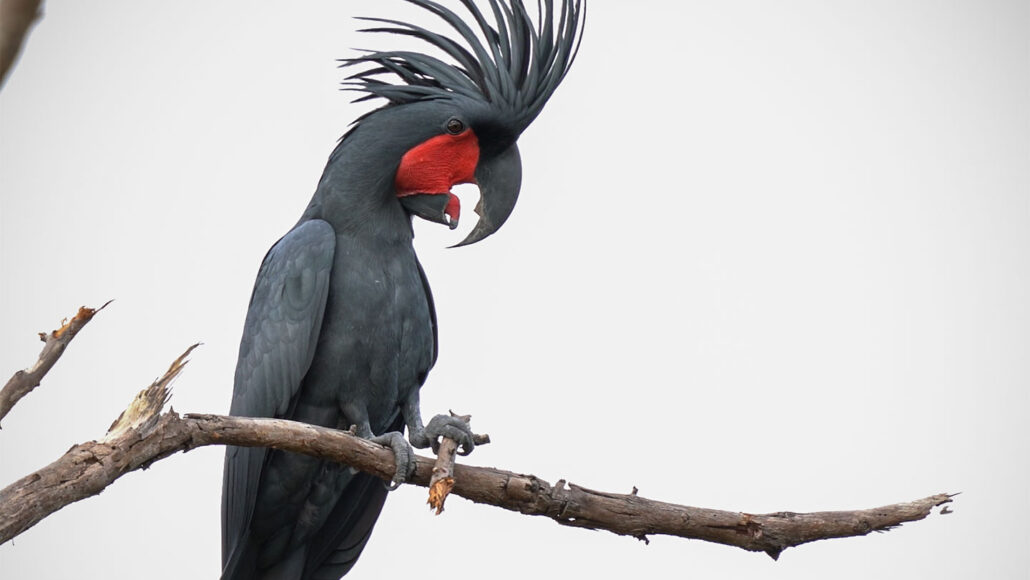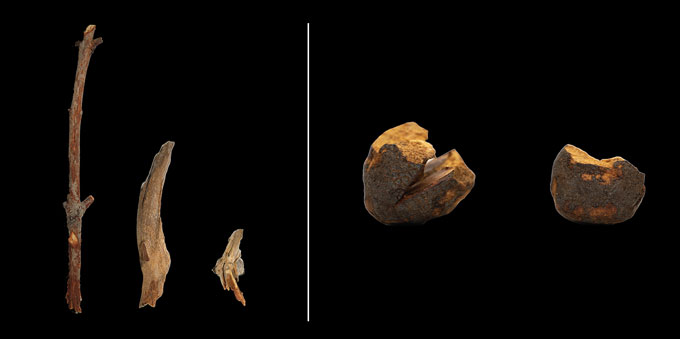Some cockatoos craft drumsticks, then woo mates like a rockstar
Part of a mating display, these sticks express a guy’s individual creativity and style

Rhythmic musical displays featuring custom-crafted drumsticks help male palm cockatoos woo mates. At the end of the performance, they throw the drumsticks to the ground.
C. Zdenek
By Elise Cutts
When a male palm cockatoo serenades a potential mate, it isn’t just about music. He also showcases his own personal style.
In the wild, these birds (Probosciger aterrimus) devise custom instruments for musical mating rituals, a new study reveals. And, it turns out, each bird shows its own flair. Some males used drumsticks. Others combined a mix of drumsticks and instruments made from seed pods. One maverick male marched to the beat of his own pods, using almost no drumsticks at all.
Such stylistic choices have more to do with personal preference than with available materials, biologists find. This suggests that female cockatoos might prize creativity or individuality in their mate.
The team shared its new findings September 13 in Proceedings of the Royal Society B.
Signature stylings
The wild palm cockatoo’s distinctive instrumental performance is not “a routine that is always the same in every animal,” notes Alice Auersperg. She works at the University of Veterinary Medicine Vienna in Austria. A cognitive biologist, she did not take part in the new research. “There is some element of innovation to it,” she says of the birds’ performances.
Previously, Auersperg studied wild-caught Goffin’s cockatoos (Cacatua goffiniana). They were held for a short while at a research center. Those birds used sophisticated toolkits to forage for food, her team found. But wild cockatoos are rarely seen using tools in nature.
Wild palm cockatoos are proving to be an exception, however. These showy, endangered birds live in parts of northern Australia and New Guinea. They craft and use tools to find a mate, not food. And that is rare in the animal world.
Males of this species perform a percussive mating display from a tree in their territory. Typically, a guy will drum with a stick or seed pod that’s gripped in his left foot. He crafts the instrument himself as a female watches. To make a drumstick, he snaps off a tree branch and whittles it into shape. Then he sings and twirls while drumming a rhythm on the tree. Given the bird’s black and red plumage and tall, spiked crests, the scene looks a lot like a rock concert.
“Those tapping displays actually have all the hallmarks of human music using instruments,” says Rob Heinsohn. He’s a conservation biologist who works at the Australian National University in Canberra. “The males all have their own drumming signatures. Some like to do it really slowly. Some go very quickly. And then others throw in little flourishes.”

Individualized design
Heinsohn was part of a team that wondered if these rocker birds showed personal style through their instruments, too.
Over two years, the researchers searched for cockatoos in Australia’s Kutini-Payamu National Park and nearby areas. Cockatoo mating calls led them to 70 display trees. There, the scientists collected a total of 227 drumsticks and 29 seed-pod instruments. All had been discarded by the birds. Indeed, like a rock star smashing a guitar at the end of a concert, male cockatoos toss their instruments after their display.
The team compared instruments discarded by 12 different males. What they found suggested individual preference in the instrument designs. Drumstick length varied more from bird to bird than would be expected by chance. Some preferred short and stubby drumsticks. Others made longer, thinner ones.
“Each one has developed his own idea as to what makes a special drumstick,” says Heinsohn. There are many “different ways of getting it right — of being a good artist.” And that’s true “both in their musical performance, but also in the crafting of these tools,” he says. “I think being really individual and being creative and being out there on your own is part of what the females are looking for.”
Musical instruments are found across all human cultures. People often include flashy objects, too, in their romance rituals. But other animals rarely use tools for either music or mating displays. It’s also uncommon in the animal world to find evidence for creative choices among individual toolmakers.
This makes palm cockatoos fascinating. With their signature styles in music and craftsmanship, they are a reminder that humans aren’t always as special as we think.







